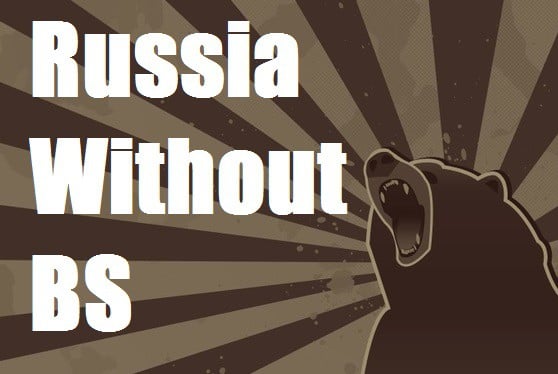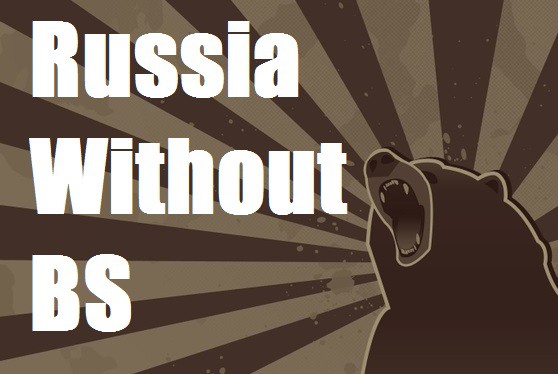
By Jim Kovpak, Russia Without BS
As I’ve said and written numerous times, when I started this blog it wasn’t intended to be political. The “BS” it was intended to counter was mostly things that people wrote about Russia, such as wildly exaggerated expat tales and spy fantasies of the Luke Harding variety. Apart from the invasion of Ukraine, one of the main reasons I started tackling Russian state propaganda was because of its lure to the Western left. I saw this as particularly insidious for several reasons.
Firstly, the Russian government, if it is anything, is far-right reactionary in outlook and it has given the bulk of its concrete support to far-right movements around the world. In no way does it care about any of the left’s causes, or any foreigner’s cause, for that matter. Secondly, Russia is in no way a real opposition force to the kind of imperialism that leftists are against. Russia generally wants to benefit from the Western-dominated global economy, but there are some contradictions between the two which have deteriorated to an almost irreconcilable level at this point. Thirdly, the Russian government is actively trying to build what is termed a “red-brown” alliance, i.e. an alliance between far-right and far-left forces. In other words, they want to make “horseshoe theory” a reality. Any leftist with principles and a firm ideological grounding should absolutely abhor such an alliance.
For a few years it seemed as though I was living in a very lonely corner of the political spectrum. Few Western leftists understood anything about Russia or its aims, and they tended to view everything through the lens of “my government = bad, regime my government doesn’t like = good.” Even the more theoretically sound leftists often refused to condemn Russia’s actions out of fear of “doing the imperialists work for them.” The people who live under the regime in Russia and those suffering from its actions abroad be damned.
Thus for me, Russia’s attempts at courting the left are attempts to “lead my people astray,” which in turn leads to the left discrediting and effectively neutralizing itself as a political force, and this is one of the main reasons I got into the “information war.” In fact I’d probably not write so much about their propaganda if they just gave up on trying to dupe the left and stuck with their far-right international confederacy of chuds.
Luckily, it seems that more Western leftists are starting to become hip to the Kremlin’s strategy. Part of the reason might be the increased exposure of Russia’s ties to the far right, including the more extreme organizations like Greece’s Golden Dawn party. Also, despite the fact that Moscow and St. Petersburg have long held international white nationalist and conservative forums, in more recent times these have been getting exposure in the popular media.
Another factor is that it seems some leftists are starting to familiarize themselves with the actual ideology behind those Russians who are trying to build this global red-brown alliance. Recently I just read this interview, which shows how expertise about Russia’s foreign influence on the left is apparently spreading. There are a couple passages I’d like to highlight here.
First, if there’s any major flaw in the article it’s this:
“First and foremost, we must reject the empire’s narrative that Russia is essentially no different from the status it had during the Cold War: that it is the main geopolitical rival of the U.S. and is an aggressive imperialist nation that seeks to swallow up all of its neighbors out of some inherent bloodlust or desire to destroy Reagan’s “city on the hill.” This type of narrative is promoted by the Democratic Party and the neocons of the Republican Party. Anybody on the left needs to take a long hard look in the mirror if they find themselves parroting the ruling class’s talking points on Russia.”
Contrasted with the experts’ far more consistent view, this seems confusing, like a way for their leftist opponents to justify their own position. What does it mean to “parrot the ruling class’ talking points on Russia?” What if the ruling class, with different motives of course, happens to be stating things that are true about Russia? Which talking points should be avoided? Again, this seems like a vulnerability to backsliding. Many unprincipled “anti-imperialists” could hide behind the excuse of not wanting to sound like the ruling class.
The second flaw has to do with the classification of Russia as imperialist.
“It is also important to examine whether Russia actually fits what we understand to be an imperialist power. If we take the standard definition of imperialism as put forth by Lenin in “Imperialism, the Highest Stage of Capitalism,” I would say that Russia does not fulfill the definition of an imperialist power: it does not monopolize finance capital, it does not use financial power as a means of power projection or acquiring raw materials.
If anything, Russia is the inverse of that, Russia is a raw material exporter and little more. So in that regard, Russia is almost more colony than colonial power. Though I do believe it is a false impression if you think Russia is merely just an oppressed global south nation like any other, it is certainly not.”
Using Lenin’s definition here is a trap, because Lenin’s theory on imperialism had a huge blindspot- the Russian Empire. And wouldn’t you know it, the authors make the same mistake here because Russia does indeed export capital as a means of power projection, and it did maintain a neo-colonial relationship with at least one very important country- Ukraine. The Russian and Ukrainian economies were extremely integrated prior to the war and this hasn’t really changed significantly after three years of fighting. It’s either ironic, or perhaps totally logical, that they would miss this because Ukraine is where Lenin’s theory of imperialism crashed upon the rocks about a century ago. The Kremlin would certainly like to have the relationship they had with Ukraine among other former Soviet republics, but they have failed in this endeavor for various reasons. One is the inability to diversify the economy away from exporting natural resources, and the other is effective competition from China in Central Asia and the EU in the West.
But to the interviewee’s credit, that last sentence about Russia not being oppressed is spot on.
Later in the interview, we see a very interesting theory put forth, and I think it is a helpful one, even if it does have a small flaw. Here is the relevant excerpt.
“The reason for this is not only to further Russia’s political interests, but also to create a parallel to what the U.S. has in Russia. In Russia, the bourgeois liberal is anti-Putin/pro-U.S., anti-Russian media/pro-Western media. And so what the Russians seek to do is to create their variant of a “fifth column” (which is the term they use in Russian media to refer to those anti-Russian liberals) to create anti-U.S. liberals, communists, socialists and fascists. They want to be able to cultivate their own online army. And they are succeeding very well.”
First of all I have to take issue with the phrase, “what the U.S. has in Russia.” This is essentially accepting the Kremlin’s narrative, that opposition to the Kremlin is cultivated by outsiders and that it’s not motivated by people’s justifiable grievances with the system. If the left is going to climb out of this outdated view of the world, it needs to start by acknowledging the agency of people in other countries. One reason left politics are so scorned in Ukraine, for example, is because when ordinary Ukrainians called out for solidarity at Maidan, much of the world left just regurgitated the Russian propaganda they’d heard, and condemned them as neo-Nazis. Despite the fact that many Ukrainians hold generally progressive views (at least far more progressive than the pro-Russian Ukrainians), the Western left basically embarrassed itself and side with their enemy without any real investigation.
Second, who are these bourgeois liberals in Russia he’s talking about? Much of the opposition in Russia consists of ordinary working people or small business owners. There are certainly wealthier elements in Russian society who can see an incentive in the replacement of Putin’s neo-feudal model of capitalism, but if we’re using the term bourgeois to mean the ruling class in Russia- they are pro-Putin. You can’t be in Russia’s ruling class without being on Putin’s side.
This being said, it’s important to see things from the perspective of the Russian geopolitical strategists. They do believe that the opposition is a “fifth column” created by the West, and the Russian opposition is also a very big tent movement, with ethno-nationalists sharing the same space as LGBT activists and other liberals. This composition is also similar to that of Euromaidan as well. If we’re speaking about Russian strategy, what the strategists believe is relevant, no matter how delusional or inaccurate such beliefs may be.
As such, the interviewee is probably onto something by suggesting that Russia wants to create this big tent “opposition” movement, a large movement of people who are categorically opposed to their own government no matter what it does. If it appealed only to the left or to the right, it wouldn’t gain the numbers to have an effect, but if it appeals to the whole radical spectrum, then it’s another story.
Does Dugin dream of this fifth column overthrowing the government in some kind of Russian-inspired “color revolution?” It’s certainly possible in his delusional mind. But while such a scenario is entirely imaginary, a large “fifth column” can still aid Russian foreign policy goals by amplifying and repeating its propaganda. This can be effective because typically Russian propaganda is not about getting people to push for pro-Kremlin policies, but rather to get them to oppose the policies they don’t like. Given (often justifiable) attitudes in America these days, it’s very easy to convince people that their government shouldn’t be doing something.
In any case, it’s good to see the left is starting to wake up to Russia’s strategy. I think you’ll see this develop most rapidly in the US and Canada. On the other side of the pond things will be more difficult. Various Communist parties with their heads too far up their 20th century asses seem to struggle with the very idea that Russia has nothing to do with the Soviet Union, which was an abject failure for all intents and purposes, and those who do acknowledge this still suffer from the delusion that it’s somehow “opposing American imperialism.” On the other hand, we have an advantage when it comes to waking them up, because oftentimes these parties and organizations are located in countries where the Russians are quite openly supporting their mortal enemies from the far-right.
As the interviewee says- we are fighting a two-front struggle. But changing the world was never going to be easy.
By Jim Kovpak, Russia Without BS





